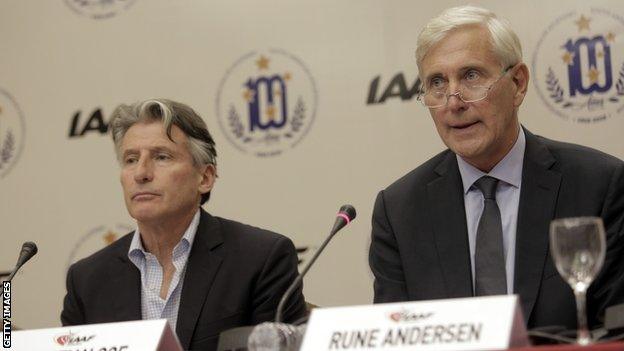IAAF upholds Russia's ban from athletics into 2019
- Published

Rune Andersen (right), pictured with IAAF president Lord Sebastian Coe, said the IAAF had received "no assurances" it would receive samples from Moscow's former anti-doping laboratory
Russian athletes will remain banned from international competitions after the IAAF upheld the country's suspension into 2019.
Athletics' governing body banned Russia in November 2015 because of evidence of state-sponsored doping.
The ban will remain in place until samples and data from Moscow's former anti-doping laboratory are made available.
Russia must also pay all costs incurred by the work of the IAAF's task force.
"I hope they'll deliver the data by the end of this year," said Rune Andersen, head of the IAAF's task force on Russia. "But I cannot go any further than that.
"We've received no assurances it will be delivered to us directly.
"Assurances have been given to Wada (World Anti-Doping Agency) and Wada have set a deadline of 31 December to receive the data. We'll have to rely on receiving the data from Wada before handing it to the AIU (Athletics Integrity Unit)."
It is the ninth time the IAAF has turned down Russia's appeal for reinstatement.
The decision puts the IAAF at odds with other sporting bodies such as Wada and the International Olympic Committee (IOC), who have revoked their own suspensions of Russia.
In February, Russia's Olympic membership was restored following its suspension from the 2018 Pyeongchang Winter Games, while Wada lifted its three-year ban in September.
The ruling means Russian athletes will not be able to compete under their own flag at the European Indoor Championships in February.
However, athletes who have met the IAAF doping review board's drug-testing criteria will be allowed to compete under a neutral flag in Glasgow.
More than 70 Russian athletes competed as neutrals at the European Championships in Berlin in August.
On Tuesday, the IAAF also announced the 2023 World Athletics Championships will be held in Budapest, Hungary.
Reaction - Russia 'not surprised' by ruling
Dmitry Shlyakhtin, president of Russia's athletics federation, speaking to Russian news agency TASS: "I am not surprised, but we had hopes because the federation has done lots of work."
Mims Davies, Minister for Sport and Civil Society: "Doping scandals in athletics have damaged the faith of both fans and competitors, and the IAAF decision today is a clear message that Russia must co-operate fully before it can be back in the fold.
"The IAAF and Wada has set out criteria of what needs to happen. For the sake of integrity in international sport and to restore the trust of athletes and fans, Russia must act and allow access to the Moscow laboratory, the relevant stored test samples and data by the end of this year."
Travis Tygart, head of the US Anti-Doping Agency: "Over the past three years the IAAF has shown to be the beacon of hope for all sports organisations by taking a lead in addressing doping, standing up for clean athletes by suspending Russia, setting up the truly independent and pioneering Athletics Integrity Unit, and consistently pursuing cases for dopers of Russia's state-sponsored doping regime.
"The IAAF's decision to keep Russia suspended is a refreshing reminder that anti-doping decision-making should always be built on principles.
"We all hope a clean Russia returns to the international sporting community, but not at the expense of clean athletes and not at the expense of the Olympic values.
"Let's hope this outcome continues to ensure lasting change and the right outcome - that is what clean athletes, governments and sports fans all across the world deserve and expect, now more than ever."